The Mabo Case: Impact on Aboriginal Land Rights in Australia
VerifiedAdded on 2020/05/16
|8
|2139
|250
AI Summary
The Mabo Case represents a pivotal moment in Australian legal history that dismantled the long-standing doctrine of terra nullius—'land belonging to no one.' Prior to this landmark decision in 1992, Indigenous Australians were largely unrecognized under the law concerning land ownership. The High Court's ruling acknowledged their traditional rights and connection to the land, leading directly to the enactment of the Native Title Act in 1993. This paper examines the transformative effects of the Mabo case on legal frameworks governing indigenous land rights, exploring both its positive outcomes and persisting challenges. It discusses how native title claims have been facilitated and restricted by subsequent legislation, judicial interpretations, and political dynamics. Additionally, it evaluates the broader implications for social justice and reconciliation efforts within Australia, highlighting ongoing debates about the effectiveness of the Native Title Act in addressing historical injustices faced by Indigenous communities. Through case studies like Griffiths v Northern Territory of Australia [2016], this paper underscores the complex interplay between legal recognition and practical realities, emphasizing the need for a more equitable approach to indigenous land rights moving forward.
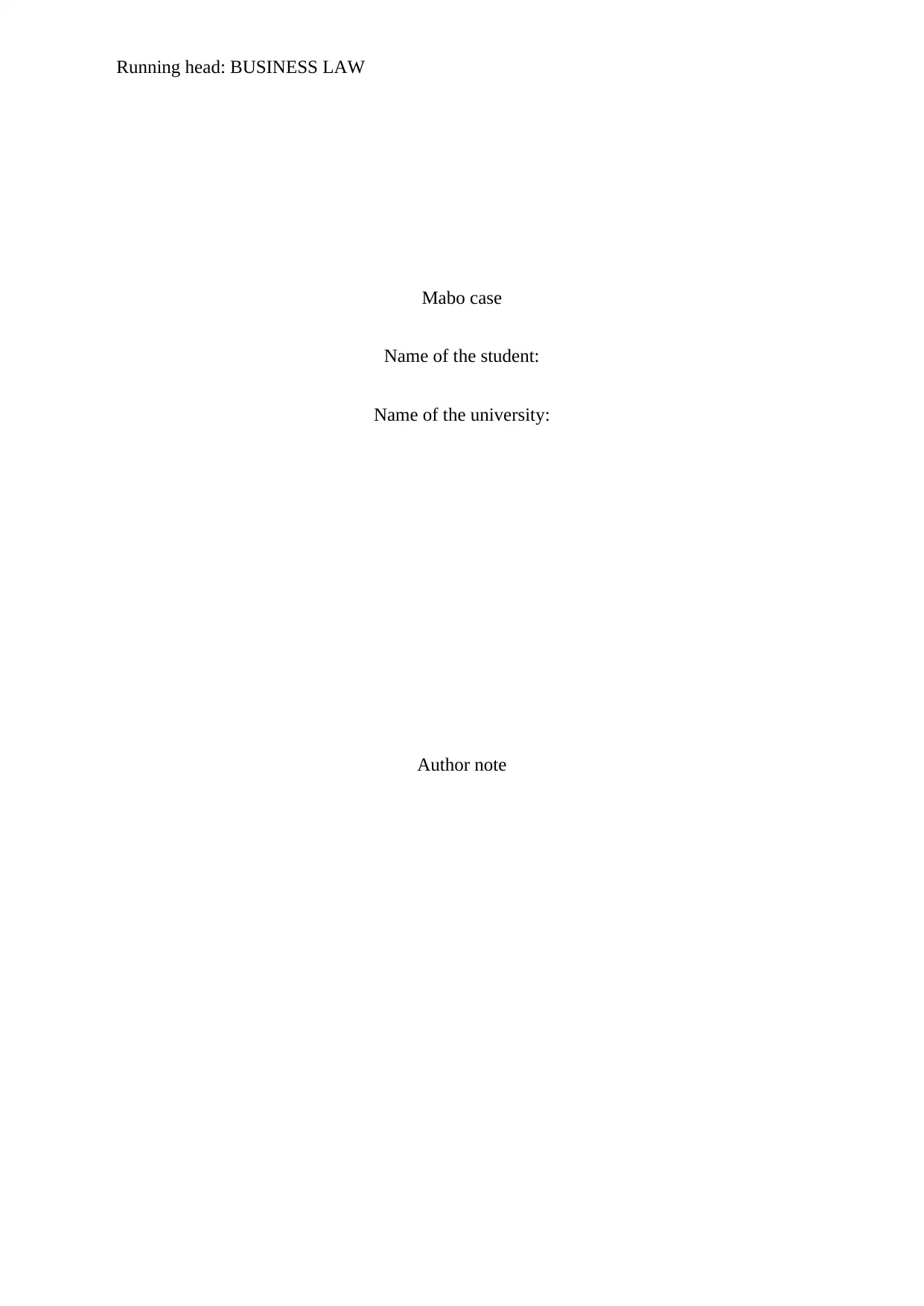
Running head: BUSINESS LAW
Mabo case
Name of the student:
Name of the university:
Author note
Mabo case
Name of the student:
Name of the university:
Author note
Paraphrase This Document
Need a fresh take? Get an instant paraphrase of this document with our AI Paraphraser
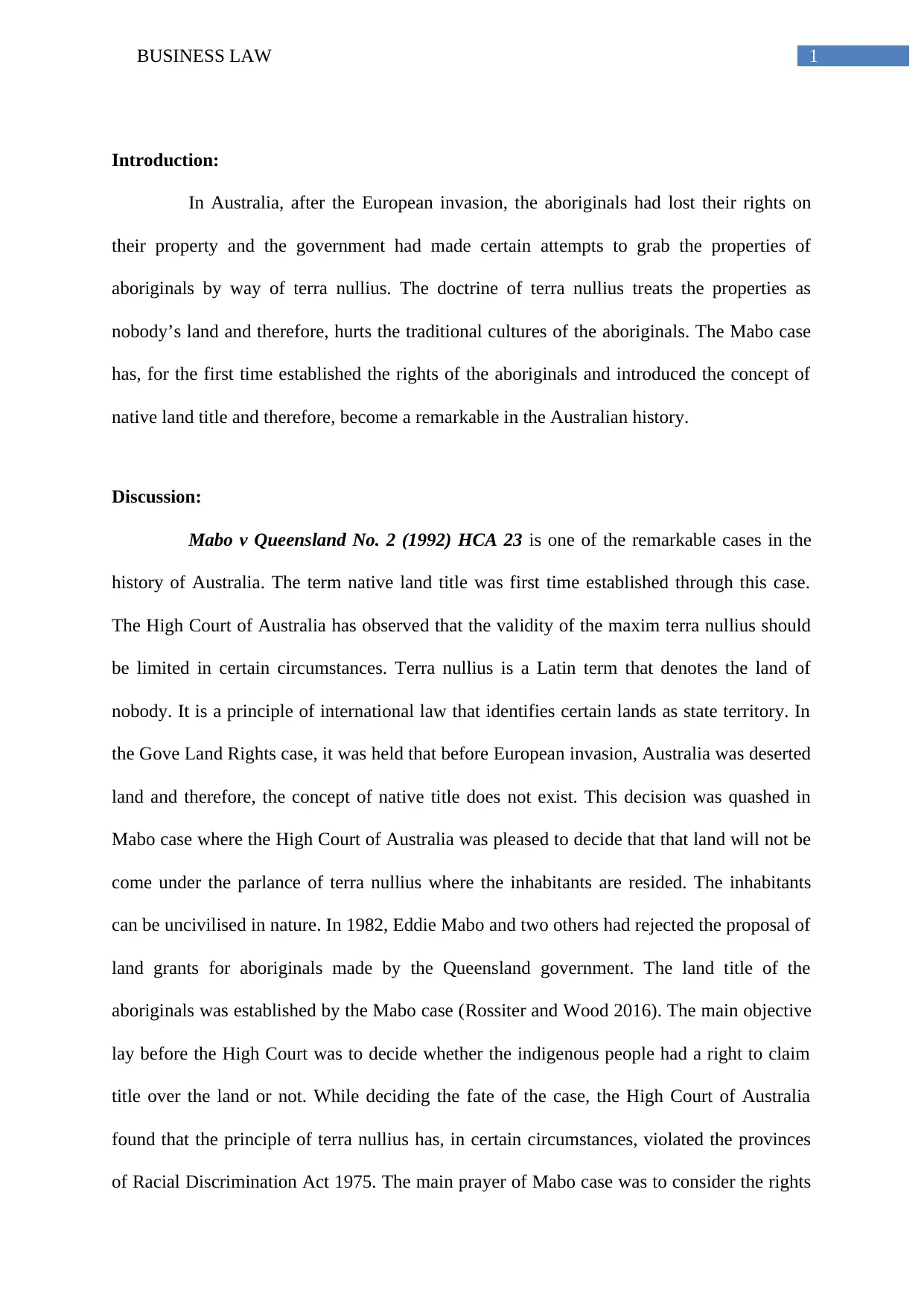
1BUSINESS LAW
Introduction:
In Australia, after the European invasion, the aboriginals had lost their rights on
their property and the government had made certain attempts to grab the properties of
aboriginals by way of terra nullius. The doctrine of terra nullius treats the properties as
nobody’s land and therefore, hurts the traditional cultures of the aboriginals. The Mabo case
has, for the first time established the rights of the aboriginals and introduced the concept of
native land title and therefore, become a remarkable in the Australian history.
Discussion:
Mabo v Queensland No. 2 (1992) HCA 23 is one of the remarkable cases in the
history of Australia. The term native land title was first time established through this case.
The High Court of Australia has observed that the validity of the maxim terra nullius should
be limited in certain circumstances. Terra nullius is a Latin term that denotes the land of
nobody. It is a principle of international law that identifies certain lands as state territory. In
the Gove Land Rights case, it was held that before European invasion, Australia was deserted
land and therefore, the concept of native title does not exist. This decision was quashed in
Mabo case where the High Court of Australia was pleased to decide that that land will not be
come under the parlance of terra nullius where the inhabitants are resided. The inhabitants
can be uncivilised in nature. In 1982, Eddie Mabo and two others had rejected the proposal of
land grants for aboriginals made by the Queensland government. The land title of the
aboriginals was established by the Mabo case (Rossiter and Wood 2016). The main objective
lay before the High Court was to decide whether the indigenous people had a right to claim
title over the land or not. While deciding the fate of the case, the High Court of Australia
found that the principle of terra nullius has, in certain circumstances, violated the provinces
of Racial Discrimination Act 1975. The main prayer of Mabo case was to consider the rights
Introduction:
In Australia, after the European invasion, the aboriginals had lost their rights on
their property and the government had made certain attempts to grab the properties of
aboriginals by way of terra nullius. The doctrine of terra nullius treats the properties as
nobody’s land and therefore, hurts the traditional cultures of the aboriginals. The Mabo case
has, for the first time established the rights of the aboriginals and introduced the concept of
native land title and therefore, become a remarkable in the Australian history.
Discussion:
Mabo v Queensland No. 2 (1992) HCA 23 is one of the remarkable cases in the
history of Australia. The term native land title was first time established through this case.
The High Court of Australia has observed that the validity of the maxim terra nullius should
be limited in certain circumstances. Terra nullius is a Latin term that denotes the land of
nobody. It is a principle of international law that identifies certain lands as state territory. In
the Gove Land Rights case, it was held that before European invasion, Australia was deserted
land and therefore, the concept of native title does not exist. This decision was quashed in
Mabo case where the High Court of Australia was pleased to decide that that land will not be
come under the parlance of terra nullius where the inhabitants are resided. The inhabitants
can be uncivilised in nature. In 1982, Eddie Mabo and two others had rejected the proposal of
land grants for aboriginals made by the Queensland government. The land title of the
aboriginals was established by the Mabo case (Rossiter and Wood 2016). The main objective
lay before the High Court was to decide whether the indigenous people had a right to claim
title over the land or not. While deciding the fate of the case, the High Court of Australia
found that the principle of terra nullius has, in certain circumstances, violated the provinces
of Racial Discrimination Act 1975. The main prayer of Mabo case was to consider the rights
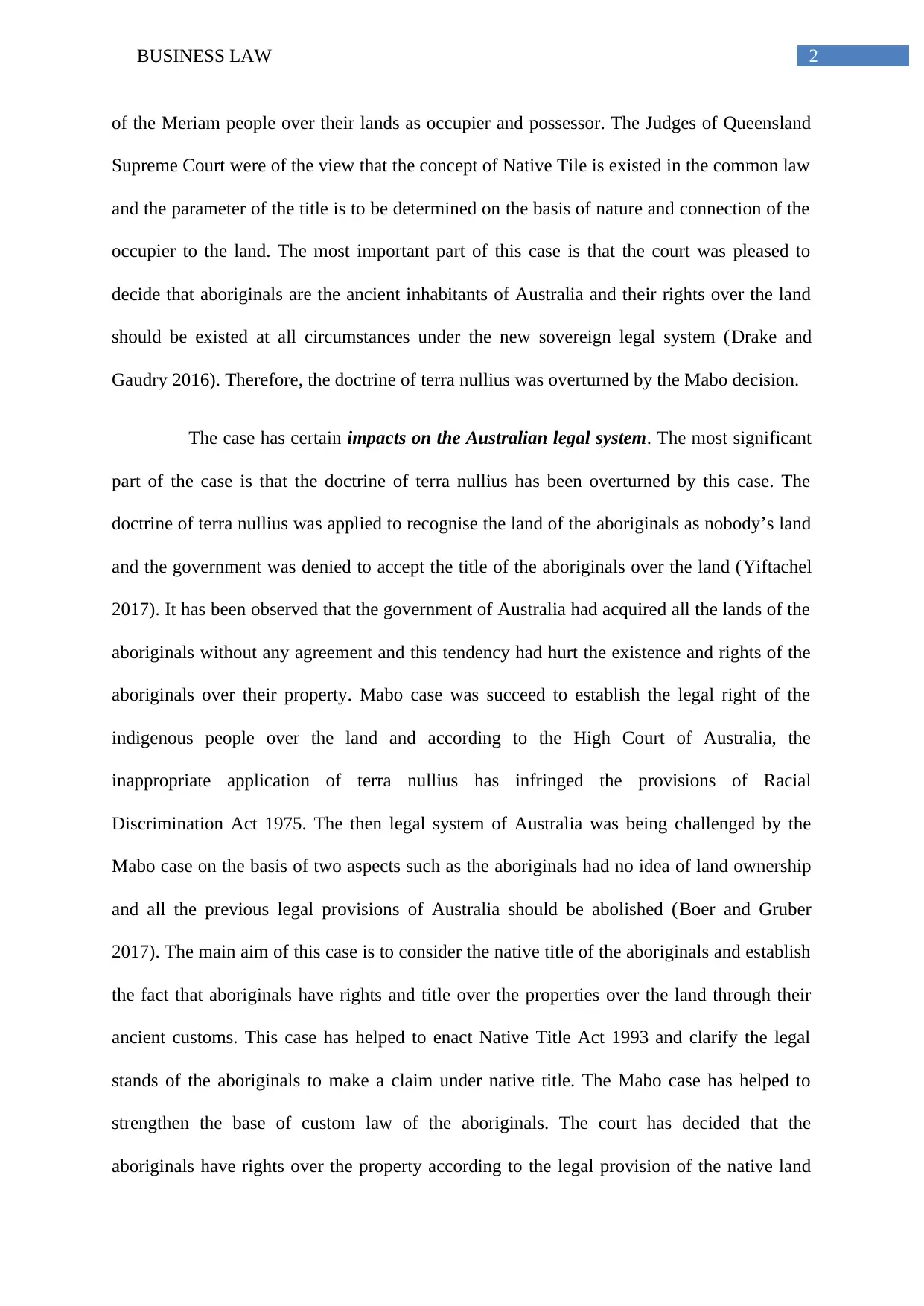
2BUSINESS LAW
of the Meriam people over their lands as occupier and possessor. The Judges of Queensland
Supreme Court were of the view that the concept of Native Tile is existed in the common law
and the parameter of the title is to be determined on the basis of nature and connection of the
occupier to the land. The most important part of this case is that the court was pleased to
decide that aboriginals are the ancient inhabitants of Australia and their rights over the land
should be existed at all circumstances under the new sovereign legal system (Drake and
Gaudry 2016). Therefore, the doctrine of terra nullius was overturned by the Mabo decision.
The case has certain impacts on the Australian legal system. The most significant
part of the case is that the doctrine of terra nullius has been overturned by this case. The
doctrine of terra nullius was applied to recognise the land of the aboriginals as nobody’s land
and the government was denied to accept the title of the aboriginals over the land (Yiftachel
2017). It has been observed that the government of Australia had acquired all the lands of the
aboriginals without any agreement and this tendency had hurt the existence and rights of the
aboriginals over their property. Mabo case was succeed to establish the legal right of the
indigenous people over the land and according to the High Court of Australia, the
inappropriate application of terra nullius has infringed the provisions of Racial
Discrimination Act 1975. The then legal system of Australia was being challenged by the
Mabo case on the basis of two aspects such as the aboriginals had no idea of land ownership
and all the previous legal provisions of Australia should be abolished (Boer and Gruber
2017). The main aim of this case is to consider the native title of the aboriginals and establish
the fact that aboriginals have rights and title over the properties over the land through their
ancient customs. This case has helped to enact Native Title Act 1993 and clarify the legal
stands of the aboriginals to make a claim under native title. The Mabo case has helped to
strengthen the base of custom law of the aboriginals. The court has decided that the
aboriginals have rights over the property according to the legal provision of the native land
of the Meriam people over their lands as occupier and possessor. The Judges of Queensland
Supreme Court were of the view that the concept of Native Tile is existed in the common law
and the parameter of the title is to be determined on the basis of nature and connection of the
occupier to the land. The most important part of this case is that the court was pleased to
decide that aboriginals are the ancient inhabitants of Australia and their rights over the land
should be existed at all circumstances under the new sovereign legal system (Drake and
Gaudry 2016). Therefore, the doctrine of terra nullius was overturned by the Mabo decision.
The case has certain impacts on the Australian legal system. The most significant
part of the case is that the doctrine of terra nullius has been overturned by this case. The
doctrine of terra nullius was applied to recognise the land of the aboriginals as nobody’s land
and the government was denied to accept the title of the aboriginals over the land (Yiftachel
2017). It has been observed that the government of Australia had acquired all the lands of the
aboriginals without any agreement and this tendency had hurt the existence and rights of the
aboriginals over their property. Mabo case was succeed to establish the legal right of the
indigenous people over the land and according to the High Court of Australia, the
inappropriate application of terra nullius has infringed the provisions of Racial
Discrimination Act 1975. The then legal system of Australia was being challenged by the
Mabo case on the basis of two aspects such as the aboriginals had no idea of land ownership
and all the previous legal provisions of Australia should be abolished (Boer and Gruber
2017). The main aim of this case is to consider the native title of the aboriginals and establish
the fact that aboriginals have rights and title over the properties over the land through their
ancient customs. This case has helped to enact Native Title Act 1993 and clarify the legal
stands of the aboriginals to make a claim under native title. The Mabo case has helped to
strengthen the base of custom law of the aboriginals. The court has decided that the
aboriginals have rights over the property according to the legal provision of the native land
⊘ This is a preview!⊘
Do you want full access?
Subscribe today to unlock all pages.

Trusted by 1+ million students worldwide
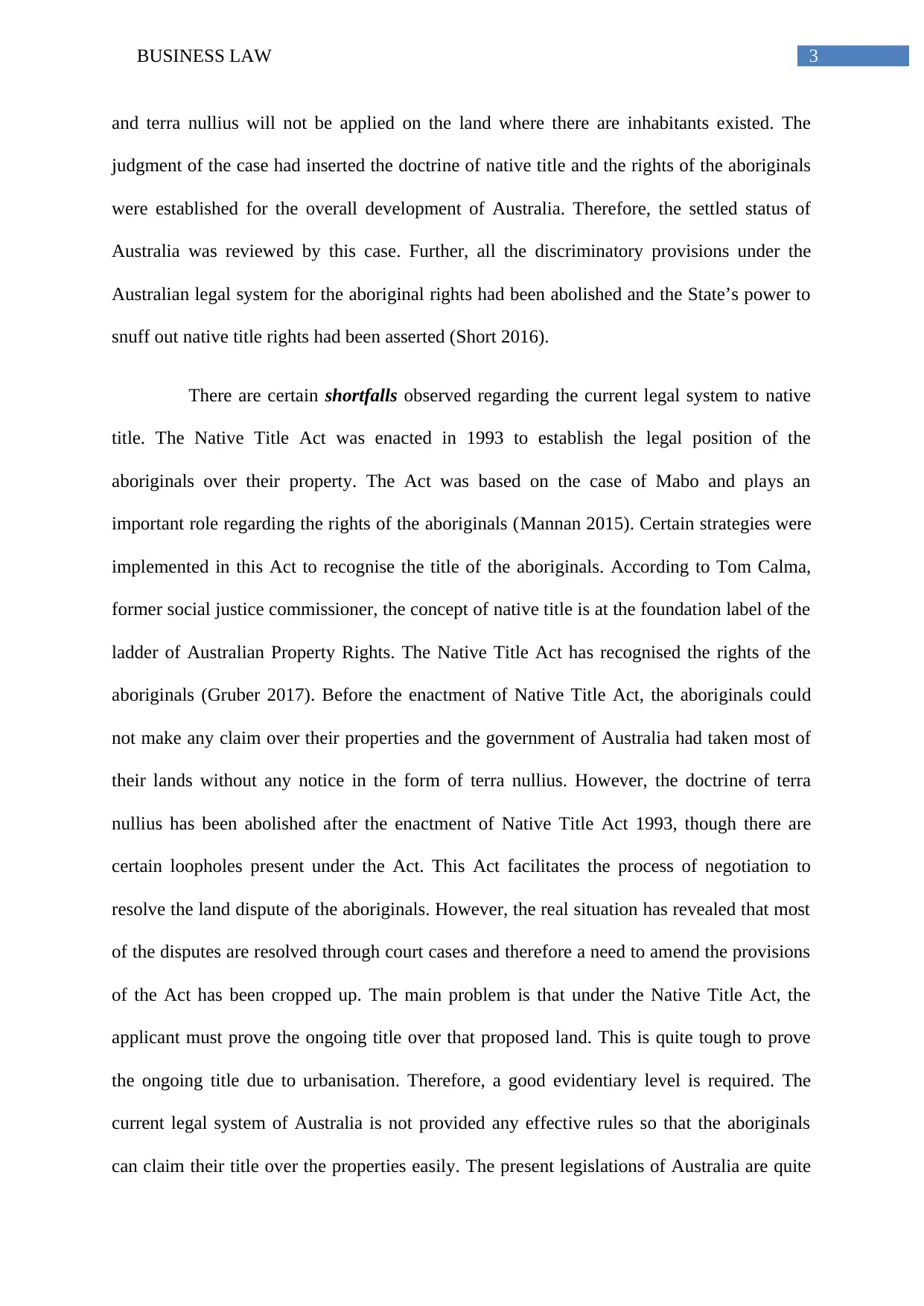
3BUSINESS LAW
and terra nullius will not be applied on the land where there are inhabitants existed. The
judgment of the case had inserted the doctrine of native title and the rights of the aboriginals
were established for the overall development of Australia. Therefore, the settled status of
Australia was reviewed by this case. Further, all the discriminatory provisions under the
Australian legal system for the aboriginal rights had been abolished and the State’s power to
snuff out native title rights had been asserted (Short 2016).
There are certain shortfalls observed regarding the current legal system to native
title. The Native Title Act was enacted in 1993 to establish the legal position of the
aboriginals over their property. The Act was based on the case of Mabo and plays an
important role regarding the rights of the aboriginals (Mannan 2015). Certain strategies were
implemented in this Act to recognise the title of the aboriginals. According to Tom Calma,
former social justice commissioner, the concept of native title is at the foundation label of the
ladder of Australian Property Rights. The Native Title Act has recognised the rights of the
aboriginals (Gruber 2017). Before the enactment of Native Title Act, the aboriginals could
not make any claim over their properties and the government of Australia had taken most of
their lands without any notice in the form of terra nullius. However, the doctrine of terra
nullius has been abolished after the enactment of Native Title Act 1993, though there are
certain loopholes present under the Act. This Act facilitates the process of negotiation to
resolve the land dispute of the aboriginals. However, the real situation has revealed that most
of the disputes are resolved through court cases and therefore a need to amend the provisions
of the Act has been cropped up. The main problem is that under the Native Title Act, the
applicant must prove the ongoing title over that proposed land. This is quite tough to prove
the ongoing title due to urbanisation. Therefore, a good evidentiary level is required. The
current legal system of Australia is not provided any effective rules so that the aboriginals
can claim their title over the properties easily. The present legislations of Australia are quite
and terra nullius will not be applied on the land where there are inhabitants existed. The
judgment of the case had inserted the doctrine of native title and the rights of the aboriginals
were established for the overall development of Australia. Therefore, the settled status of
Australia was reviewed by this case. Further, all the discriminatory provisions under the
Australian legal system for the aboriginal rights had been abolished and the State’s power to
snuff out native title rights had been asserted (Short 2016).
There are certain shortfalls observed regarding the current legal system to native
title. The Native Title Act was enacted in 1993 to establish the legal position of the
aboriginals over their property. The Act was based on the case of Mabo and plays an
important role regarding the rights of the aboriginals (Mannan 2015). Certain strategies were
implemented in this Act to recognise the title of the aboriginals. According to Tom Calma,
former social justice commissioner, the concept of native title is at the foundation label of the
ladder of Australian Property Rights. The Native Title Act has recognised the rights of the
aboriginals (Gruber 2017). Before the enactment of Native Title Act, the aboriginals could
not make any claim over their properties and the government of Australia had taken most of
their lands without any notice in the form of terra nullius. However, the doctrine of terra
nullius has been abolished after the enactment of Native Title Act 1993, though there are
certain loopholes present under the Act. This Act facilitates the process of negotiation to
resolve the land dispute of the aboriginals. However, the real situation has revealed that most
of the disputes are resolved through court cases and therefore a need to amend the provisions
of the Act has been cropped up. The main problem is that under the Native Title Act, the
applicant must prove the ongoing title over that proposed land. This is quite tough to prove
the ongoing title due to urbanisation. Therefore, a good evidentiary level is required. The
current legal system of Australia is not provided any effective rules so that the aboriginals
can claim their title over the properties easily. The present legislations of Australia are quite
Paraphrase This Document
Need a fresh take? Get an instant paraphrase of this document with our AI Paraphraser
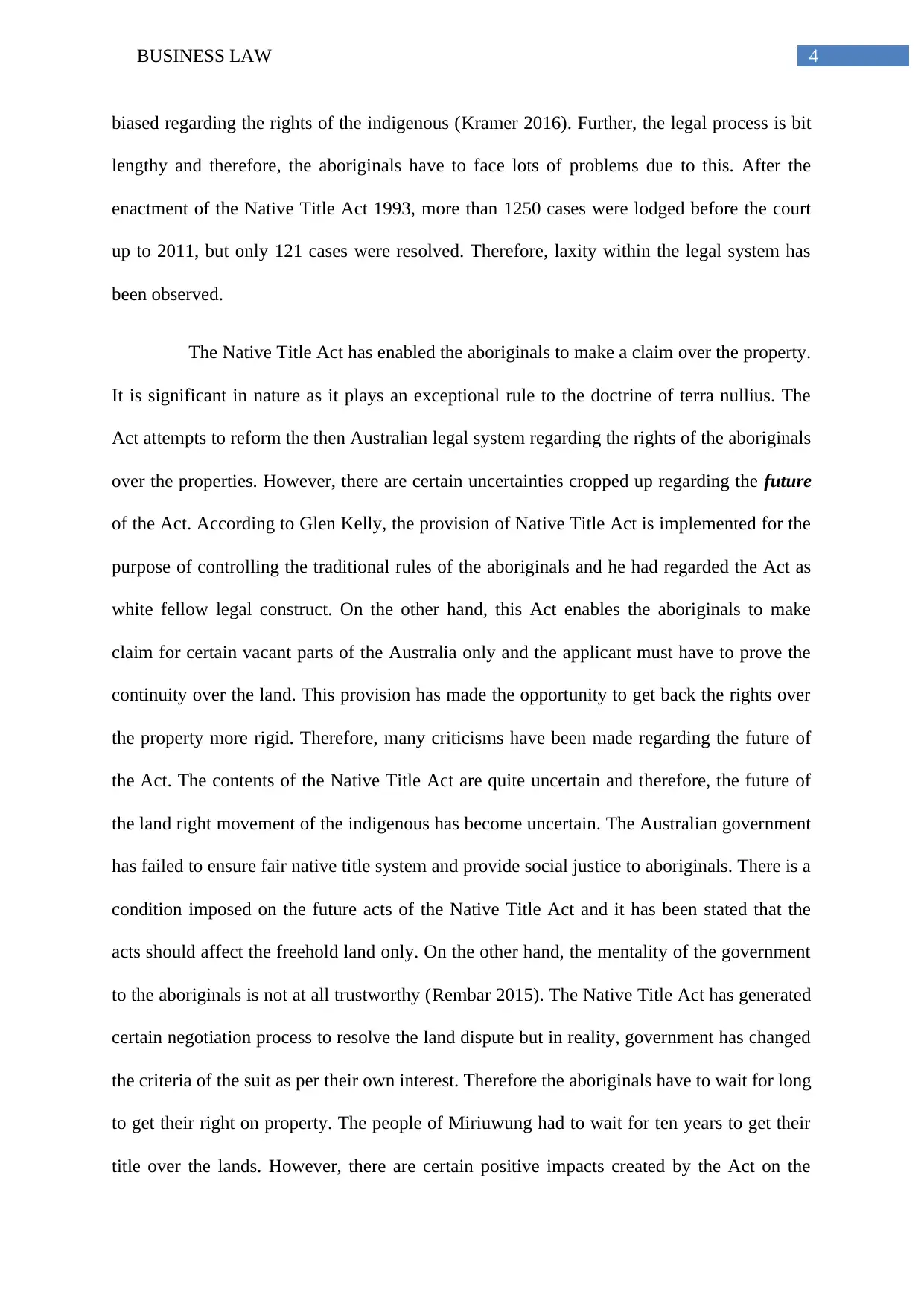
4BUSINESS LAW
biased regarding the rights of the indigenous (Kramer 2016). Further, the legal process is bit
lengthy and therefore, the aboriginals have to face lots of problems due to this. After the
enactment of the Native Title Act 1993, more than 1250 cases were lodged before the court
up to 2011, but only 121 cases were resolved. Therefore, laxity within the legal system has
been observed.
The Native Title Act has enabled the aboriginals to make a claim over the property.
It is significant in nature as it plays an exceptional rule to the doctrine of terra nullius. The
Act attempts to reform the then Australian legal system regarding the rights of the aboriginals
over the properties. However, there are certain uncertainties cropped up regarding the future
of the Act. According to Glen Kelly, the provision of Native Title Act is implemented for the
purpose of controlling the traditional rules of the aboriginals and he had regarded the Act as
white fellow legal construct. On the other hand, this Act enables the aboriginals to make
claim for certain vacant parts of the Australia only and the applicant must have to prove the
continuity over the land. This provision has made the opportunity to get back the rights over
the property more rigid. Therefore, many criticisms have been made regarding the future of
the Act. The contents of the Native Title Act are quite uncertain and therefore, the future of
the land right movement of the indigenous has become uncertain. The Australian government
has failed to ensure fair native title system and provide social justice to aboriginals. There is a
condition imposed on the future acts of the Native Title Act and it has been stated that the
acts should affect the freehold land only. On the other hand, the mentality of the government
to the aboriginals is not at all trustworthy (Rembar 2015). The Native Title Act has generated
certain negotiation process to resolve the land dispute but in reality, government has changed
the criteria of the suit as per their own interest. Therefore the aboriginals have to wait for long
to get their right on property. The people of Miriuwung had to wait for ten years to get their
title over the lands. However, there are certain positive impacts created by the Act on the
biased regarding the rights of the indigenous (Kramer 2016). Further, the legal process is bit
lengthy and therefore, the aboriginals have to face lots of problems due to this. After the
enactment of the Native Title Act 1993, more than 1250 cases were lodged before the court
up to 2011, but only 121 cases were resolved. Therefore, laxity within the legal system has
been observed.
The Native Title Act has enabled the aboriginals to make a claim over the property.
It is significant in nature as it plays an exceptional rule to the doctrine of terra nullius. The
Act attempts to reform the then Australian legal system regarding the rights of the aboriginals
over the properties. However, there are certain uncertainties cropped up regarding the future
of the Act. According to Glen Kelly, the provision of Native Title Act is implemented for the
purpose of controlling the traditional rules of the aboriginals and he had regarded the Act as
white fellow legal construct. On the other hand, this Act enables the aboriginals to make
claim for certain vacant parts of the Australia only and the applicant must have to prove the
continuity over the land. This provision has made the opportunity to get back the rights over
the property more rigid. Therefore, many criticisms have been made regarding the future of
the Act. The contents of the Native Title Act are quite uncertain and therefore, the future of
the land right movement of the indigenous has become uncertain. The Australian government
has failed to ensure fair native title system and provide social justice to aboriginals. There is a
condition imposed on the future acts of the Native Title Act and it has been stated that the
acts should affect the freehold land only. On the other hand, the mentality of the government
to the aboriginals is not at all trustworthy (Rembar 2015). The Native Title Act has generated
certain negotiation process to resolve the land dispute but in reality, government has changed
the criteria of the suit as per their own interest. Therefore the aboriginals have to wait for long
to get their right on property. The people of Miriuwung had to wait for ten years to get their
title over the lands. However, there are certain positive impacts created by the Act on the
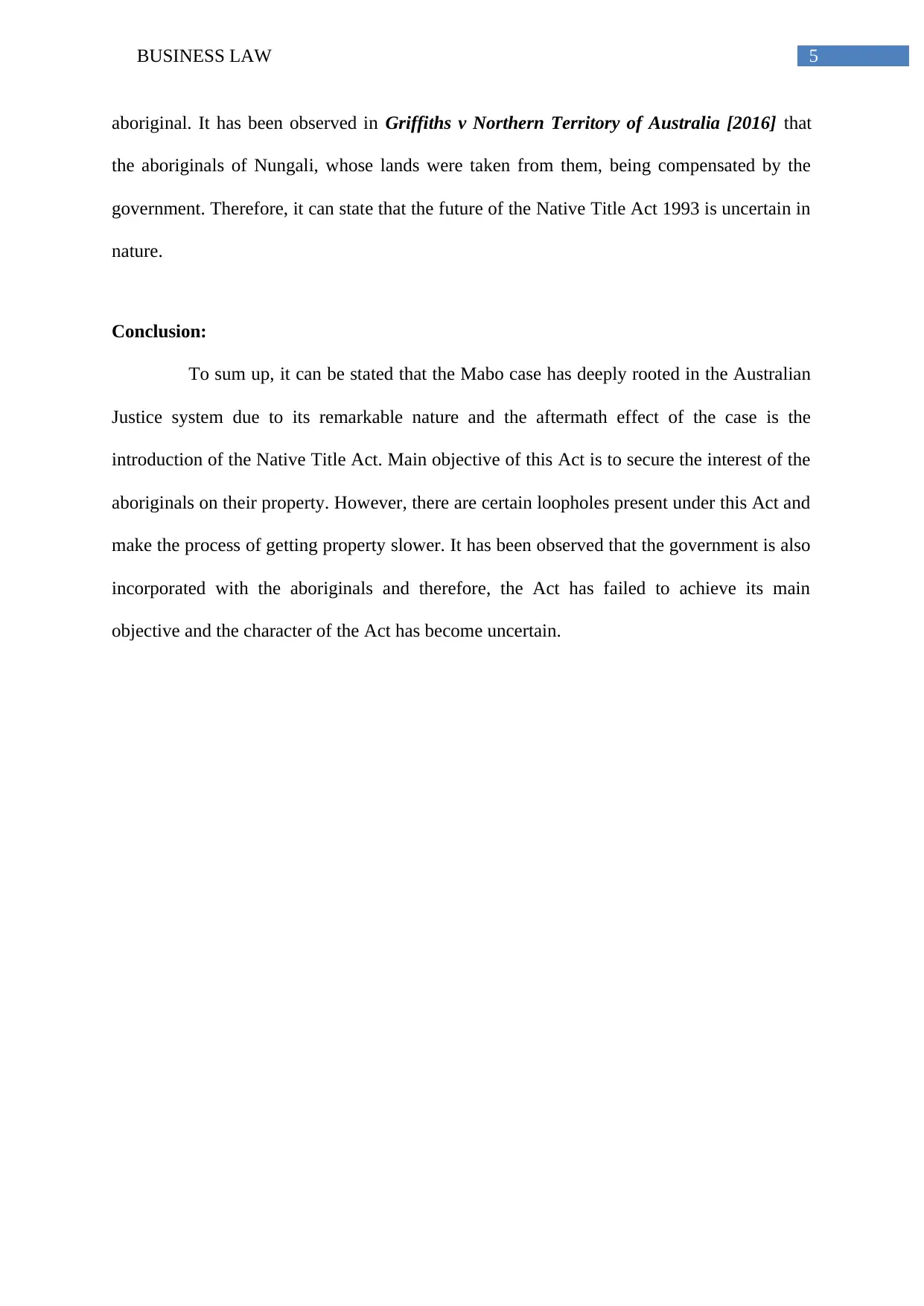
5BUSINESS LAW
aboriginal. It has been observed in Griffiths v Northern Territory of Australia [2016] that
the aboriginals of Nungali, whose lands were taken from them, being compensated by the
government. Therefore, it can state that the future of the Native Title Act 1993 is uncertain in
nature.
Conclusion:
To sum up, it can be stated that the Mabo case has deeply rooted in the Australian
Justice system due to its remarkable nature and the aftermath effect of the case is the
introduction of the Native Title Act. Main objective of this Act is to secure the interest of the
aboriginals on their property. However, there are certain loopholes present under this Act and
make the process of getting property slower. It has been observed that the government is also
incorporated with the aboriginals and therefore, the Act has failed to achieve its main
objective and the character of the Act has become uncertain.
aboriginal. It has been observed in Griffiths v Northern Territory of Australia [2016] that
the aboriginals of Nungali, whose lands were taken from them, being compensated by the
government. Therefore, it can state that the future of the Native Title Act 1993 is uncertain in
nature.
Conclusion:
To sum up, it can be stated that the Mabo case has deeply rooted in the Australian
Justice system due to its remarkable nature and the aftermath effect of the case is the
introduction of the Native Title Act. Main objective of this Act is to secure the interest of the
aboriginals on their property. However, there are certain loopholes present under this Act and
make the process of getting property slower. It has been observed that the government is also
incorporated with the aboriginals and therefore, the Act has failed to achieve its main
objective and the character of the Act has become uncertain.
⊘ This is a preview!⊘
Do you want full access?
Subscribe today to unlock all pages.

Trusted by 1+ million students worldwide
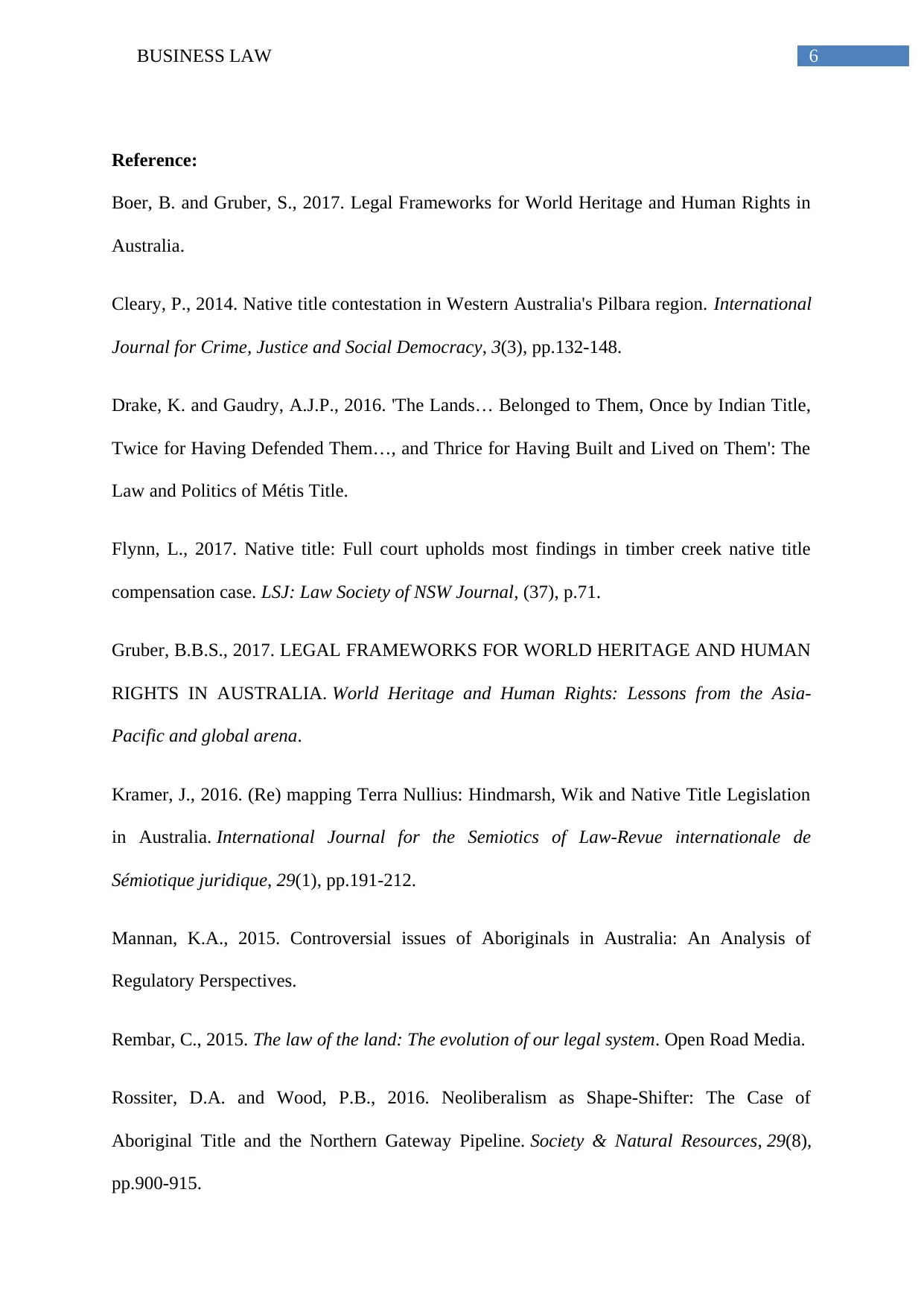
6BUSINESS LAW
Reference:
Boer, B. and Gruber, S., 2017. Legal Frameworks for World Heritage and Human Rights in
Australia.
Cleary, P., 2014. Native title contestation in Western Australia's Pilbara region. International
Journal for Crime, Justice and Social Democracy, 3(3), pp.132-148.
Drake, K. and Gaudry, A.J.P., 2016. 'The Lands… Belonged to Them, Once by Indian Title,
Twice for Having Defended Them…, and Thrice for Having Built and Lived on Them': The
Law and Politics of Métis Title.
Flynn, L., 2017. Native title: Full court upholds most findings in timber creek native title
compensation case. LSJ: Law Society of NSW Journal, (37), p.71.
Gruber, B.B.S., 2017. LEGAL FRAMEWORKS FOR WORLD HERITAGE AND HUMAN
RIGHTS IN AUSTRALIA. World Heritage and Human Rights: Lessons from the Asia-
Pacific and global arena.
Kramer, J., 2016. (Re) mapping Terra Nullius: Hindmarsh, Wik and Native Title Legislation
in Australia. International Journal for the Semiotics of Law-Revue internationale de
Sémiotique juridique, 29(1), pp.191-212.
Mannan, K.A., 2015. Controversial issues of Aboriginals in Australia: An Analysis of
Regulatory Perspectives.
Rembar, C., 2015. The law of the land: The evolution of our legal system. Open Road Media.
Rossiter, D.A. and Wood, P.B., 2016. Neoliberalism as Shape-Shifter: The Case of
Aboriginal Title and the Northern Gateway Pipeline. Society & Natural Resources, 29(8),
pp.900-915.
Reference:
Boer, B. and Gruber, S., 2017. Legal Frameworks for World Heritage and Human Rights in
Australia.
Cleary, P., 2014. Native title contestation in Western Australia's Pilbara region. International
Journal for Crime, Justice and Social Democracy, 3(3), pp.132-148.
Drake, K. and Gaudry, A.J.P., 2016. 'The Lands… Belonged to Them, Once by Indian Title,
Twice for Having Defended Them…, and Thrice for Having Built and Lived on Them': The
Law and Politics of Métis Title.
Flynn, L., 2017. Native title: Full court upholds most findings in timber creek native title
compensation case. LSJ: Law Society of NSW Journal, (37), p.71.
Gruber, B.B.S., 2017. LEGAL FRAMEWORKS FOR WORLD HERITAGE AND HUMAN
RIGHTS IN AUSTRALIA. World Heritage and Human Rights: Lessons from the Asia-
Pacific and global arena.
Kramer, J., 2016. (Re) mapping Terra Nullius: Hindmarsh, Wik and Native Title Legislation
in Australia. International Journal for the Semiotics of Law-Revue internationale de
Sémiotique juridique, 29(1), pp.191-212.
Mannan, K.A., 2015. Controversial issues of Aboriginals in Australia: An Analysis of
Regulatory Perspectives.
Rembar, C., 2015. The law of the land: The evolution of our legal system. Open Road Media.
Rossiter, D.A. and Wood, P.B., 2016. Neoliberalism as Shape-Shifter: The Case of
Aboriginal Title and the Northern Gateway Pipeline. Society & Natural Resources, 29(8),
pp.900-915.
Paraphrase This Document
Need a fresh take? Get an instant paraphrase of this document with our AI Paraphraser

7BUSINESS LAW
Short, D., 2016. Reconciliation and colonial power: Indigenous rights in Australia.
Routledge.
Yiftachel, O., 2017. ‘Terra nullius’ and planning. The Routledge Companion to Planning in
the Global South, p.243.
Short, D., 2016. Reconciliation and colonial power: Indigenous rights in Australia.
Routledge.
Yiftachel, O., 2017. ‘Terra nullius’ and planning. The Routledge Companion to Planning in
the Global South, p.243.
1 out of 8
Related Documents
Your All-in-One AI-Powered Toolkit for Academic Success.
+13062052269
info@desklib.com
Available 24*7 on WhatsApp / Email
![[object Object]](/_next/static/media/star-bottom.7253800d.svg)
Unlock your academic potential
Copyright © 2020–2026 A2Z Services. All Rights Reserved. Developed and managed by ZUCOL.




![Mabo Case [No.2]: Analyzing Impact on Australian Legal System](/_next/image/?url=https%3A%2F%2Fdesklib.com%2Fmedia%2Fmabo-case-impact-australian-legal-system_page_2.jpg&w=256&q=75)